≡-Thailand’s Latest Border Closure and Travel Ban Disrupt Southeast Asian Tourism as Air and Land Routes to Cambodia Are Severely Impacted by Rising Tensions – Viral of Today
<> Viral of Today <>
Home » ASIA » Thailand’s Latest Border Closure and Travel Ban Disrupt Southeast Asian Tourism as Air and Land Routes to Cambodia Are Severely Impacted by Rising Tensions Tuesday, June 24, 2025Thailand’s latest border closure and travel ban have caused significant disruption to Southeast Asian tourism, particularly affecting air and land routes to Cambodia. The rising tensions between the two nations, stemming from a long-standing territorial dispute, have led to the immediate closure of major land border crossings like the Aranyaprathet–Poipet checkpoint, and the suspension of flights to Siem Reap. These travel restrictions have not only hindered the flow of tourists heading to Cambodia’s iconic sites like Angkor Wat but also severely impacted cross-border trade and regional travel, creating widespread uncertainty for travelers and businesses alike.Tensions between Cambodia and Thailand have flared up significantly since late May, stemming from a long-standing territorial dispute over disputed border areas. This geopolitical rift has now entered a critical phase, with both governments implementing various measures that directly affect international travel between the two countries. On June 24, Thailand announced sweeping travel restrictions that will have far-reaching effects on land and air travel. The new travel bans, targeting land crossings and air routes, have disrupted the movement of travelers and pose significant challenges for tourism and trade between Cambodia and Thailand.Land Border Closure and Impact on TravelersThe Thai government’s decision to close all land borders between the two nations has taken immediate effect, with the most notable being the closure of the Aranyaprathet–Poipet checkpoint. This land crossing, one of the busiest border points between Cambodia and Thailand, serves as a crucial link for travelers, particularly those heading to popular Cambodian destinations such as Battambang and Siem Reap. The latter is renowned worldwide for the Angkor Wat temple complex, a UNESCO World Heritage Site that attracts millions of tourists annually.Tourists planning to visit Siem Reap and other Cambodian destinations will now face considerable obstacles in their travel plans, as the Aranyaprathet–Poipet crossing is an essential route for road-based travel between Thailand and Cambodia. In addition to tourists, cross-border trade and daily commuters who rely on this passage for business or personal reasons are also affected by the new restrictions.The move to shut down all land crossings follows increasing military tensions, with both countries taking heightened security measures. It reflects a broader pattern of military responses to escalating border disputes, raising concerns over the stability of the region. With no alternative direct land route available, travelers seeking to enter Cambodia from Thailand will now need to find alternative routes through neighboring countries such as Laos or Vietnam, leading to significant delays and logistical challenges.Aviation Restrictions and Air Travel DisruptionsWhile the land border closure has caused immediate disruptions for overland travelers, the impact on air travel is also becoming increasingly apparent. The Thai military’s decision to prohibit all foreign travelers from flying to Siem Reap from Thailand has added an additional layer of complexity to the situation. This policy shift has effectively grounded flights to one of Cambodia’s most significant tourist hubs, causing confusion and frustration for air travelers.Notably, Bangkok Airways, one of the primary airlines operating between Thailand and Cambodia, has been significantly impacted. The carrier traditionally operates three daily flights between Bangkok’s Suvarnabhumi Airport and Siem Reap, with an average load factor of 55-60%. Despite the new restrictions, Bangkok Airways has confirmed that it has no plans to suspend its services to Cambodia. The airline has assured travelers that it will continue to operate flights from its Bangkok hub, although the situation remains fluid, and passengers are advised to stay updated on any changes to flight schedules.Emirates, another major airline serving the region, also operates flights between Bangkok and Siem Reap. The Dubai-based airline flies four times a week from Dubai to Siem Reap via Bangkok, with full traffic rights. However, with the Thai government’s new ban on inbound foreign travel, these flights are currently grounded, severely affecting both leisure and business travel between Cambodia, Thailand, and the UAE.Thai AirAsia, which operates 12 weekly flights between Bangkok’s Don Mueang Airport and Siem Reap, has similarly been affected by the new restrictions. While the airline has not yet provided detailed information on its plans to adjust flight schedules, travelers are advised to directly contact the airline for the latest updates on flight availability.Implications for Tourism and the Broader EconomyThe newly imposed travel restrictions are expected to have a profound impact on both countries’ tourism industries. Cambodia, which has long been a popular destination for tourists, particularly those visiting Angkor Wat, is likely to experience a significant drop in the number of visitors. Thailand, as the primary gateway for travelers coming to Cambodia, will also suffer from reduced tourism revenue as a result of the disruption in air and land travel.Both countries have worked for years to build and strengthen their tourism industries, with millions of international visitors annually crossing their borders. The closure of such important transportation routes not only threatens tourism but also affects trade and regional cooperation. Businesses and individuals engaged in cross-border trade between the two nations are likely to face delays and added costs due to the closure of land and air routes.In addition to the tourism and economic impact, the border tensions raise concerns about the safety of travelers in the region. Travelers from across the world will need to reassess their travel plans to ensure their safety and avoid any unforeseen disruptions. The Thai government’s move to restrict land travel and flights could further complicate international relations in Southeast Asia, especially as tensions over territorial disputes continue to evolve.Advice for TravelersIn light of the escalating tensions and the newly imposed travel restrictions, travelers are strongly advised to remain vigilant and consult with their airlines directly to stay informed about the status of their flights. Travelers planning to visit Cambodia from Thailand should expect potential delays and alternative routes to be necessary.For those with plans to cross the border by land, alternative routes through neighboring countries may provide limited solutions, but travelers should prepare for significant delays. Travelers who have already booked flights should check with their airlines regarding any changes to flight schedules and the possible impact of the restrictions.Thailand’s border closure and travel ban have severely disrupted Southeast Asian tourism, especially air and land routes to Cambodia, as rising tensions from a territorial dispute have led to significant travel delays and hindered cross-border trade.ConclusionThe ongoing tensions between Cambodia and Thailand, exacerbated by a simmering border dispute, have resulted in sweeping travel restrictions that are affecting both land and air travel. With the closure of major border checkpoints and the suspension of flights to Siem Reap, travelers are advised to reconsider their plans and consult with airlines for up-to-date information. As the situation continues to develop, it remains uncertain when or if the restrictions will be lifted. The geopolitical situation in Southeast Asia is now at a critical juncture, with implications that will likely affect not only tourism but also the broader economy of both countries.
This information will surprise you!
See also
- Read until the end to discover everything.
- Important information you need to know.
- Interesting facts and helpful tips.
Conclusion
Did you enjoy the news? Keep following us daily!













